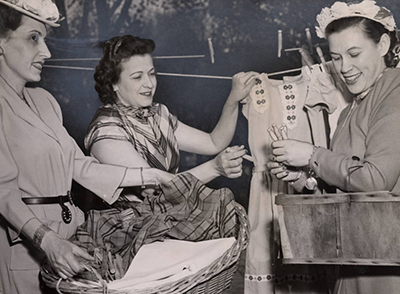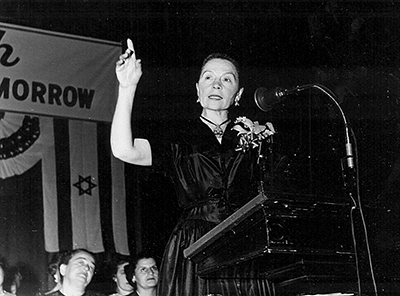Hadassah
Feature
Hadassah Zionism Shaped American Zionism

Although there’s not just one woman’s take on Zionism, since 1912, there’s been a clear Hadassah take. Hadassah Zionism sees Israel as central to Jewish life, wherever you live. It builds a democratic Jewish state through Practical Zionism to serve the citizens of that state—Jewish and non-Jewish—and the world. It is nonpartisan, welcoming all who support Israel. And it educates about Jewish peoplehood and statehood as active commitments, not passive sentiments.
When Henrietta Szold founded Hadassah in 1912, it was not at all likely that a women’s Zionist organization would survive. Most American Jews were too busy building their own homes in their new country to help other Jews rebuild the homeland. But Hadassah’s Practical Zionism, as a June 1914 resolution explained, was going “to promote Jewish institutions and enterprises in Palestine, and to foster Zionist ideals in America.” Many Americanizing, prosperous Jews were happy to send nurses, start hospitals, feed schoolchildren and build playgrounds for their less fortunate fellow Jews in Palestine. At the same time, many assimilating Jews appreciated this nonreligious, nonpartisan way to be Jewish while expressing American liberal ideals.
Gil Troy’s feature “‘The Zionist Ideals’ Reclaims Women’s Voices” explores his update of Arthur Hertzberg’s classic Zionist text.
When President Harry S. Truman recognized the new State of Israel in 1948, the resulting euphoria solidified American Jewry’s new Zionist consensus: supporting a Jewish state for the millions of persecuted Jews who needed it. But facing Prime Minister David Ben-Gurion’s Israel-or-bust Zionism—insisting that every Jew had to immigrate to the nascent state—most American Zionists squirmed. Few dared to insult Ben-Gurion. But even fewer believed that America represented exile, or that it was not a viable Jewish home for them.
Enter Rose Halprin. Having lived in Palestine for five years after completing her first term as Hadassah national president in 1934, Halprin solved the problem by defining chalutziyut, pioneering, as Jewish, Zionist and American in spirit. This meant you could be a good Zionist by helping to build Israel, not necessarily living in it. Fluent in Hebrew, Halprin branded the Zionist mission as “kibbutz galuyot,” ingathering exiles, not “kibbutz hagaluyot,” ingathering all the exiles. And she defined Zionism emotionally, saying: “A Zionist has more than platonic feelings. You are in his blood and bones, and he cannot get rid of you.”

Halprin’s balance was Hadassah’s balance—galvanizing millions of American Jewish women over generations in a nonpolitical, passionate, pioneering, state-transforming, American Zionist mission.
Today, Hadassah’s Practical Zionism has expanded to include what I call Identity Zionism, defining what Zionism and Israel means personally. This approach sees Israel as an ideological anchor and an inspiring platform that shapes one’s Judaism and one’s activism, bringing democratic Jewish values to life. Increasingly, American Zionists recognize that having this extraordinary Jewish democracy that is Israel helps not only “them” over there but also “us” here.
There’s still a lot of clarifying to do: explaining that Jews are both a people and a religious community; articulating why proud American Jews benefit from having Israel—even when we disagree with it; and defining the missions that build identity and institutions in America and Israel, at home and in the homeland. And that is why Hadassah’s Defining Zionism in the 21st Century initiative is so important.
To celebrate Israel’s 70th, we need to learn about Zionism from experts who have participated in that video series—and we need to have Zionist salons to further personal conversations about what this movement means to each of us.
Some may argue that Hadassah could divorce itself from Zionism now that the State of Israel exists. But that would reject so much of its history, its ideology, its passion, its glue—in short, its defining mission. Without Zionism, Hadassah, the Women’s Zionist Organization of America, wouldn’t just stop being Zionist; it would stop being Hadassah.










 Facebook
Facebook Instagram
Instagram Twitter
Twitter
Leave a Reply